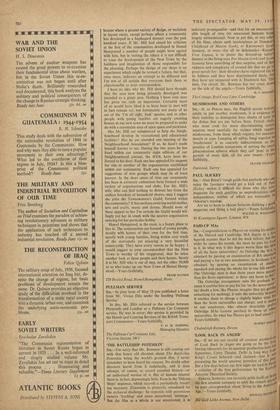'THE BATTLESHIP POTEMKIN'
SIR.—I'm sorry that Mr. Bowness is still coming out with that hoary old chestnut about The Battleship Potemkin being the world's greatest film. I never remember to have heard his reasons. No doubt other directors learnt from it technically, and it does attempt, of course, to record essential history—or an authorised version of it. But of human interest there is, in fact, depressingly little. Even in the 'Odessa Steps' sequence, which records a particularly revolt- ing massacre, Eisenstein is primarily stimulated by the technical challenge : he responds with precocious Camera 'tracking' and more sensational 'montage.'. But the film as a whole is not sensational; it is tediously propagandist—and that for an uneonscion able length of time (its occasional humour beia largely unintentional). Now to put this, or any odic of his films, above such masterpieces as Donska Childhood of Maxim Gorki, or Kurosawa's Seven Samurai, or even—for all its deficiencies—Kazan't Viva Zapata, is to prefer the dressed-up tailor's dummy to the living man. For Maxim Gorki and seven Samurai have something of that surprise, and of thin richness and complexity of created life that we go t° great novels for : their directOrs have registered life in its fullness and they have discriminated finely, but they have not tampered with it. Eisenstein has, This time, I'm afraid, Mr. Bowness has not come down on the side of the angels.—Yours faithfully,
N. V. HENI.REY The Cottage, Red Cross Lane, Cambridge














































 Previous page
Previous page